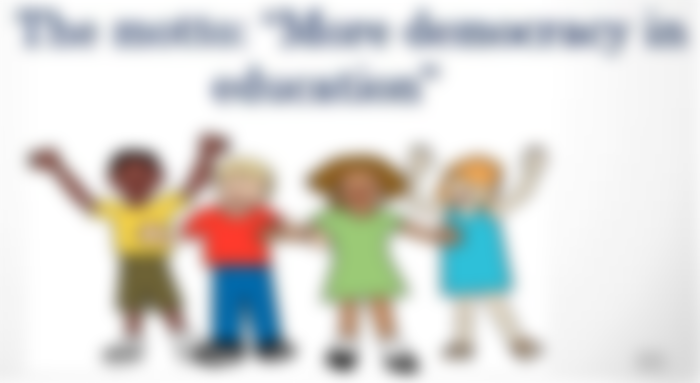One of the most important roles of formal education, in many countries, is shaping good, obedient citizens, who share one common identity and who are loyal to the nation-state. And although it no doubt served a noble purpose, and in certain social circumstances and was necessary, in most cases it is precisely this role has led to the marginalization of numerous, ethnically diverse peoples, whose cultures, religions, languages or ways of life did not coincide with the so-called national ideal.
In many countries even today there are tensions between the functions and demands of the national system of education, values, interests, and aspirations of different people. A school institution, no matter how important and independent today is a social one phenomenon, it is determined by social frameworks that sometimes cannot be opposed.
When it is a word about the social system, as a factor of socialization, school goals, and program it will differ significantly in a democratic system from those within an authoritarian one system.

In the school system, democracy in education should not be understood only as someone external, legal, and political issue, but, above all, as an internal, pedagogical issue. As a question of the mutual relations of those who know, can and can, towards those who do not know, they cannot and do not know-how; those who have a certain social power and role and those who are just on the path of personal affirmation; older and stronger, according to the younger and weaker, members of one sex towards members of the other sex, those who evaluate and decide and those who evaluate and decides on.
Education is becoming more and more transformed, from the process of leading and teaching, in a complex pedagogically shaped system of mutual communications. With that in ties, democracy is a condition for the success of these communications. As for status personality, as well as in terms of motivation to work within certain conditions and relationships. Numerous research in the field of pedagogy and psychology speaks of the greater effects of the work of the so-called "Democratic teacher" in relation to teachers who are characterized by authoritarianism, indifference, ruthlessness, arrogance, and similar qualities.
In a democratically organized system, respecting this principle, the teacher provides an equal position in the participation of students and teachers in the common and interactive learning, in considering current events in the classroom, school, and social environment with the application and deepening of acquired civic knowledge. He also makes it possible to partner and democratic participation of students in deciding on important issues of preparation and teaching civic education and other subjects, as well as justice in evaluating and promoting student work.
The principle of equality, democracy, and responsibility implies organization of educational activities and application of such methods and means of education, in which it will be available to all without exception (regardless of race, religion, nation, economic power, the social reputation of parents) to have the same treatment, position, and respect personalities. This refers to the mutual relations of the pupils and the relations between the educators and pupils. The history of upbringing and school gives us many examples when they are democratic relations and democratic conduct were only a distant vision and utopia of pedagogical reformers.
Totalitarian state systems, hierarchical relations, mutual exploitation of social groups, religious and national intolerance, ruthlessness rich to poor, authoritarian attitudes of the elderly towards the younger, and so on, they were, and still are often, an obstacle to respecting this requirement in education. However, within the existing social barriers, all those who work in education are obliged to fight for creating the most democratic atmosphere possible, which is a condition of any progress and progress in education.

Respecting these principles enables the socialization of the individual's personality in the civic education of a democratic atmosphere and is realized more intensively in cooperative and interactive (tandem, group, class) learning and effective joint teaching. Mostly, interactive main exercises allow exchange of experiences, arguments, information, ideas, compromise, tolerance cultural and other differences, allowing students to develop nonviolent skills communicating, associating, preferring the common good and forming traits personalities of democratic value orientations and prosocial behavior, and they are properties characteristic of democratic citizenship. The balance of the individualized, interactive and collaborative learning, creativity, and teaching in civic education the complementary requirements of this principle is balanced and optimally achieved socialization of authentic personalities.


Learning is not longer limited to the early stages of human life,to formal systems such as schools,universities or vocational training processes.In a perion of rapid,permanent and lasting change,learning is becoming a lifelong goal of individuals,society and the state.